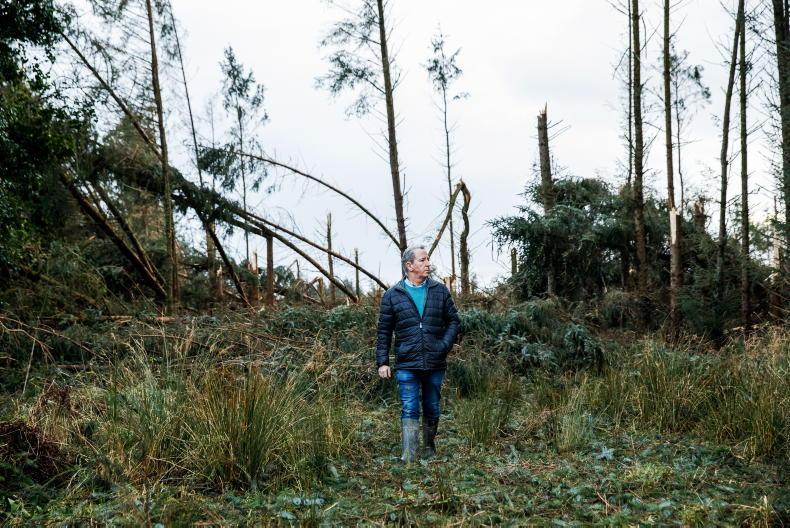Minister of State Pippa Hackett commissioned a forestry regulatory review last August “relating to the 15km appropriate assessment (AA) screening and the requirement for a licence for forest management operations such as thinning and forest roads”.
The report carried out by commercial law firm Philip Lee LLP has “reviewed and critically analysed the existing EU and domestic legal framework for the licensing of forestry activities, including relevant case law”, according to report author Alice Whittaker.
In preparing the review, she was asked by Minister Hackett to consider “the legal and procedural arrangements in a sample of other EU member states in conducting this exercise, and to include in its recommendations any lessons to be learnt from that exercise”. Countries chosen were Belgium, Denmark and Scotland, although no longer an EU member.
EU law in Irish forestry, appropriate assessment (AA) procedures, EU environmental law and consent regime are addressed in the first part of the report, along with challenges in implementing EU law in the Irish forestry sector.
The report outlines the background to the 2019 revision to the Department’s AA screening procedures and the lead-up to the current licensing crisis and why “almost overnight” a much larger proportion of applications were systematically referred to the specialist ecological section of the Department for the purposes of carrying out an AA.
This, in the opinion of the report “is the principal reason why currently over 80% of applications are referred to ecology, significantly delaying the issuing of most licences”.
To tackle this, the report focuses “on potential interim solutions to both streamline and speed up the process of AA for the proportion of applications which will continue to be referred to ecology”.
In addition, it seeks to address concerns “in relation to certain standard mitigation which is mandatory and integral to all forestry” arising from the Court of Justice of the EU (CJEU), case “People over Wind”.
The report refutes concerns about Ireland’s licensing system being unique in Europe.
Despite last year’s findings by the IFA and the Association of Farm & Forestry Contractors in Ireland (FCI) that thinning licences are not required in Sweden, Germany, France, Finland, Portugal, Denmark and Lithuania, the report recommends non-exemption for thinning licences.
It also states: “Our research indicates … that difficulties with the practical implementation of CJEU rulings are not unique to Ireland, or to the Irish forestry sector.”
The report also opposes the adoption of “a single integrated licence for all forestry activities”.
An independent review of the regulatory system offered the perfect opportunity to bring the Irish forestry licensing system in line with other licensing authorities that comply with the same EU directives
It does recommend that the Department “considers whether there is any category of ‘thinning’ which might be considered lower risk, from an environmental and social perspective” while a similar approach is proposed for forest road construction.
The review sees advantages in the Permitted Development Rights approach in Scotland for forest roads, which, “could be introduced to the Irish planning system in due course, but would require significant legislative intervention and change to Ireland’s planning system”.
Other EU member states
Teige Ryan, of the Social, Environment and Economic Association (SEEFA), questioned the report’s research into forestry procedures in other EU member states.
“An independent review of the regulatory system offered the perfect opportunity to bring the Irish forestry licensing system in line with other licensing authorities that comply with the same EU directives,” he said.
“The final report shows little signs however of any change, and many of the rules which don’t exist in other EU member states will remain in place in Ireland regardless of most of the recommendations.”
Mark McAuley, Forest Industries Ireland (FII), said: “Although we feel that the report takes a cautious and conservative approach to regulatory reform on forestry, there are a number of recommendations that identify opportunities and pathways to improvements and streamlining.”
He said there is a recognition in the report that the utilisation of forest management plans would provide a more strategic and long-term approach to licensing.
“This could yield significant gains in terms of advance licensing of a series of activities and remove the need for individual licences for each forest management activity over the lifetime of the forest,” he said.
First recommendation
Referring to the first recommendation in the review that would formalise “standard mandatory measures through a consultative and evidence-based process”, he said: “FII supports the concept of embedding regulatory standards and binding rules in a legal framework.
“When standards can be tested by EIA and then embedded legally, this will speed up the screening process, assist in screening out more projects and speed up AA reports when projects are screened in.”
Donal Whelan, Irish Timber Growers Association, believes this recommendation has merit as long as there are no additional requirements placed in the various standards.
“It is now important that the Department immediately ?commences implementing the report’s recommendations to ensure that improvements are made to the licensing process as soon as possible,” he said.
The review opposes the removal of the 15km screening radius.
“We believe the 15km serves a practical purpose,” it states.
“It permits desktop data on European sites within a 15km radius to be gathered, as a starting point, in determining the potential zone of impact of the proposed project.”
The Project Woodland Regulatory Review Report contains 15 recommendations including the adoption of a more planned-led approach to licensing, the need for a consent regime and the introduction of time limits for Department decisions
A number of SEEFA members expressed surprise at this stance.
SEEFA members understood from their engagement with the process that removing the 15km radius was not going to be an issue and they were surprised when it was retained in the final report.
Disappointment
Donal Whelan welcomed the recommendations to amend the Forestry Act but expressed disappointment that the ITGA submission regarding the legal provision to compensate forest owners – where forestry licences are refused to applicants – has been ignored in the review.
“Section 32 of the Forestry Act 2014 entitled ‘Compensation for refusal of felling licence, etc’ was drafted to address payment of compensation to a person where an application is refused a forestry licence,” he said.
“Drafting of the required regulation providing for this compensation as included in the Forestry Act is long overdue.”
Views that there should be greater integration of forestry with agriculture, and that afforestation, in particular, should be subject to the same planning and licensing conditions as agriculture, differ with the report’s findings, which state:
“Although forestry is an agricultural activity, afforestation is a class of ‘project’ identified in the EIA Directives. Afforestation is therefore a type of project which is considered to have the potential for significant effects on the environment.”
The report doesn’t elaborate on the “significant effects” of afforestation – positive or negative – when compared with agriculture.
The Project Woodland Regulatory Review Report contains 15 recommendations including the adoption of a more planned-led approach to licensing, the need for a consent regime and the introduction of time limits for Department decisions.
These are subdivided into 28 detailed recommendations and can be accessed on the Department’s website.









SHARING OPTIONS